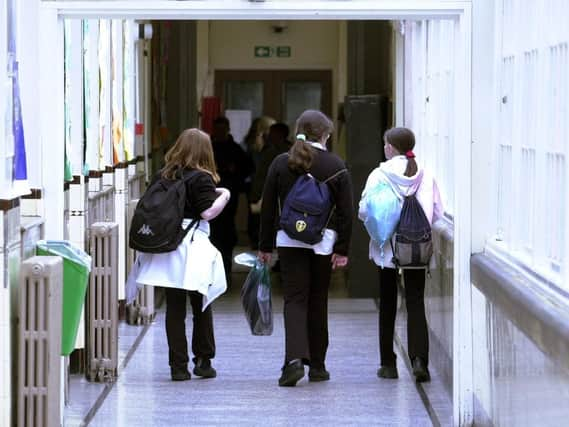The insult of not inviting teachers to the top table on Covid-19 recovery - Cameron Wyllie


It is a very clear analysis of what’s been happening and specifically what’s gone wrong in Scottish education in recent years. It’s particularly good on the terrible mistakes made with regard to the last two years of SQA exams and the problems that dog Curriculum for Excellence.
McEnaney makes the point that the Scottish Government should have already known everything that the recent OECD report complained about – and the way in which Scottish teachers are driven crazy by the process by which new policies and arrangements are handed down to them without consultation and in ‘education-speak’, which is not actuallyspoken by any real people, least of all those charged with the task of educating our children.
Advertisement
Hide AdAdvertisement
Hide AdHe calls for a ‘national conversation’ on education, pleasingly using the same phrase I do when pleading for the greater involvement of
teachers, parents and pupils in determining the way forward for Scottish education. In addition, he makes the case – the very strong case – for decreasing class contact time, for a national Kindergarten system and other sensible, necessary steps which would replicate the systems employed in other countries where education is, well, going better.
Now, let me make it clear that I don’t agree with several of his points – he’s daft on Gaelic, is too keen to ditch exams and – fairly predictably – detests private schools, though at least he actually wants to abolish private education, which is an honourable if misguided policy, as opposed to all the dickering about with the finances of independent schools proposed by some, which – of course – can only have the effect of making these schools yet more expensive and more ‘elitist’.
The big omission in his book is any mention at all of discipline and behaviour. I personally think that dealing with the ongoing malaise of low
level misbehaviour – or indeed, high level stuff - would be a very good way of beginning to close the poverty-related attainment gap. But, to be honest, I don’t imagine Mr McEnaney will be all that bothered about what I think as a retired Head of one of those very independent schools.
Still, I commend his book to anyone interested in where our schools are.
Among those who should be reading it are, of course, the Cabinet Secretary for Education and her team. Indeed, they should be reading anything they can get their hands on by anybody who has recent, practical experience of Scottish schools. They should be out and about in these schools, talking to all the people in them; they should be asking how we ‘build back better’ in Scottish education, not just following the pandemic but in order to halt the declining standards and the slow wearing away of teachers’ goodwill and patience. However, I’m not optimistic that that consultative net is being cast very wide.
Advertisement
Hide AdAdvertisement
Hide AdIf you want a depressing read, just to tarnish the feelings of optimism as Christmas approaches, just have a look at the membership of the various committees which are supposedly going to make everything in Scottish education lovely again. You might want to try, say, the Covid 19 Education Recovery Group; it appears to have 21 members, including representatives from all the usual suspect organisations – COSLA, the EIS, the GTCS, SLS, the SSTA, Education Scotland, the AHDS (look it up), the SQA. My goodness, the SQA! Even as it’s being abolished, even as the Scottish Parliament itself describes it as ‘not fit for purpose’, its Chief Executive is sitting on the ‘Group’ which proposed to advise on the way forward after the pandemic.
We are redefining hubris here in Scotland, all at the expense of the students in our schools.
Now, even worse, just have a wee guess as to who is NOT there. No, wrong, there is a parent representative; no, wrong, there is a pupil, from the Scottish Youth Parliament, but…my goodness… by my reading of that list, there isn’t a single practising teacher.
That is such an insult to the sweat and tears of our teaching students, our probationers, our teaching assistants, our teachers and the
senior managers of our schools, over the past two years of this unique conundrum called Covid. All these quangos that have presided over decline are represented but nary a practising teacher in sight.
Once your teeth are thoroughly gnashed, why not move on to the ‘Education Reform expert panel’, or the ‘Scottish Education Council’ or the ‘Curriculum and Assessment Board’.
You would think wouldn’t you, that all of these would have a majority membership of people who spend their working lives in actual schools. Well, no. The odd one or two sneak in but generally it’s just the same old faces, some of whom were teachers at one point before the quango called them in with the draw of free weekends and no marking.
All this, of course, coming from a Scottish government which uses the word ‘stakeholder’ in every other sentence, and where the push across charities and the third sector is always to have board members who have ‘lived experience’ of the work these groups undertake.
Advertisement
Hide AdAdvertisement
Hide AdThe decision-makers in Scottish education, at this perilous time in its history, need to be listening to those with ‘lived experience’ first; there are literally millions of them – teachers, parents, pupils and James McEnaney – waiting to be heard.
Cameron Wyllie’s blog is A House in Joppa